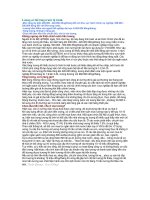Tài liệu Strictly Confidential -The Private Volker Fund Memos of Murray N. Rothbard doc
Bạn đang xem bản rút gọn của tài liệu. Xem và tải ngay bản đầy đủ của tài liệu tại đây (2.88 MB, 446 trang )
Strictly Confidential:
The Private Volker Fund
Memos of Murray N. Rothbard
Strictly Confidential:
The Private Volker Fund
Memos of Murray N. Rothbard
Edited by David Gordon
Foreword by
Brian Doherty
© 2010 by the Ludwig von Mises Institute and published under the Creative
Commons Attribution License 3.0. />Ludwig von Mises Institute
518 West Magnolia Avenue
Auburn, Alabama 36832
mises.org
ISBN: 978-1-933550-80-0
v
Foreword by Brian Doherty . . . . . . . . . . . . . . . . . . . . . . . . . . . . . . . .ix
Introduction by David Gordon . . . . . . . . . . . . . . . . . . . . . . . . . . . . . 1
I. Setting the Stage. . . . . . . . . . . . . . . . . . . . . . . . . . . . . . . . . . . . . . . . 7
Rothbard’s Confidential Memorandum to the Volker Fund,
“What Is to Be Done?” . . . . . . . . . . . . . . . . . . . . . . . . . . . . . . . . . . . 7
II. Political Theory . . . . . . . . . . . . . . . . . . . . . . . . . . . . . . . . . . . . . . . 25
1. Are Libertarians “Anarchists”? . . . . . . . . . . . . . . . . . . . . . . . 25
2. In Defense of Demagogues . . . . . . . . . . . . . . . . . . . . . . . . . . . 32
3. Willmoore Kendall, Lectures on Democratic Theory
at Buck Hill Falls . . . . . . . . . . . . . . . . . . . . . . . . . . . . . . . . . . . 35
4. Review of Charles L. Black, Jr., The People and the Court:
Judicial Review in a Democracy . . . . . . . . . . . . . . . . . . . . . . . . . .51
5. Review of Leon Bramson, The Political Context
of Sociology . . . . . . . . . . . . . . . . . . . . . . . . . . . . . . . . . . . . . . . . . 55
6. Review of Charles Percy Snow, Science and Government . . . 59
7. Report on the Voegelin Panel . . . . . . . . . . . . . . . . . . . . . . . . . 62
III. History. . . . . . . . . . . . . . . . . . . . . . . . . . . . . . . . . . . . . . . . . . . . . . 69
1. Marxism and Charles Beard. . . . . . . . . . . . . . . . . . . . . . . . . . 69
2. Review of Jackson Turner Main, The Antifederalists. . . . . . . 75
3. Review of R.W. Van Alstyne, The Rising American Empire. . . 80
4. Review of Robert V. Remini, Martin Van Buren and the
Making of the Democratic Party. . . . . . . . . . . . . . . . . . . . . . . . . 82
5. Report on George B. DeHuszar and Thomas Hulbert
Stevenson, A History of the American Republic, 2 vols. . . . . . 86
Table of Contents
vi Strictly Confidential
6. Review of Douglass C. North, The Economic Growth of the
United States, 1790–1860 . . . . . . . . . . . . . . . . . . . . . . . . . . . . . .188
7. Review of William Appleman Williams, The Tragedy of
American Diplomacy . . . . . . . . . . . . . . . . . . . . . . . . . . . . . . . . .193
8. Review of Edgar Eugene Robinson, The Hoover
Leadership . . . . . . . . . . . . . . . . . . . . . . . . . . . . . . . . . . . . . . . . . .197
9. Review of Paul W. Schroeder, The Axis Alliance and
Japanese-American Relations, 1941 . . . . . . . . . . . . . . . . . . . . . 200
10. Review of J. Fred Rippy, Globe and Hemisphere . . . . . . . . . . 203
11. Review of the Veritas Foundation, Keynes at Harvard . . . 208
12. Review of Alexander Gray, The Socialist Tradition . . . . . . . .215
13. Review of T.S. Ashton, An Economic History of England:
The Eighteenth Century . . . . . . . . . . . . . . . . . . . . . . . . . . . . . . .218
IV. Economics . . . . . . . . . . . . . . . . . . . . . . . . . . . . . . . . . . . . . . . . . . 223
1. Spotlight on Keynesian Economics . . . . . . . . . . . . . . . . . . . 223
2. Fisher’s Equation of Exchange: A Critique . . . . . . . . . . . . . .240
3. Note on the Infant-Industry Argument . . . . . . . . . . . . . . . .249
4. Report on Ronald Coase Lectures . . . . . . . . . . . . . . . . . . . . 253
5. Review of Lawrence Abbott, Quality and Competition
and Anthony Scott, Natural Resources: The Economics
of Conservation . . . . . . . . . . . . . . . . . . . . . . . . . . . . . . . . . . . . . 257
6. On the Definition of Money . . . . . . . . . . . . . . . . . . . . . . . . . 259
7. Review of John Chamberlain, The Roots of Capitalism . . . . 265
8. Letter on Henry Hazlitt and Keynes . . . . . . . . . . . . . . . . . . 277
9. Business Advocacy of Government Intervention . . . . . . . .279
10. Review of Lionel Robbins, The Great Depression. . . . . . . . . 289
11. Review of Lionel Robbins, Robert Torrens and the
Evolution of Classical Economics . . . . . . . . . . . . . . . . . . . . . . . .292
12. Untitled Letter Critical of Chicago School Economics . . . .295
13. Review of Benjamin Anderson, The Value of Money . . . . . .301
14. Review of Colin Clark, Growthmanship . . . . . . . . . . . . . . . . 302
15. Competition and the Economists. . . . . . . . . . . . . . . . . . . . . 307
Table of Contents vii
V. Foreign Policy. . . . . . . . . . . . . . . . . . . . . . . . . . . . . . . . . . . . . . . . 321
1. For a New Isolationism . . . . . . . . . . . . . . . . . . . . . . . . . . . . . .321
2. Review of Alan S. Whiting, China Crosses the Yalu. . . . . . . .327
3. Review of Frank S. Meyer, The Moulding of Communists . . .332
4. Critique of Frank S. Meyer’s Memorandum . . . . . . . . . . . . 343
5. Review of Walter Millis (ed.), A World Without War . . . . . .375
6. Review of George F. Kennan, Russia and the West
Under Lenin and Stalin . . . . . . . . . . . . . . . . . . . . . . . . . . . . . . .379
VI. Literature. . . . . . . . . . . . . . . . . . . . . . . . . . . . . . . . . . . . . . . . . . . 383
1. Romanticism and Modern Fiction . . . . . . . . . . . . . . . . . . . . 383
2. Letter on Recommended Novels . . . . . . . . . . . . . . . . . . . . . .392
3. Review of Edmund Fuller, Man in Modern Fiction. . . . . . . .395
Index . . . . . . . . . . . . . . . . . . . . . . . . . . . . . . . . . . . . . . . . . . . . . . . . . . 399
ix
I never met Murray Rothbard.
Because I am the author of Radicals for Capitalism: A Freewheeling
History of the Modern American Libertarian Movement, that was highly
unfortunate. More than any other person, Murray Rothbard was the
modern American libertarian movement.
Intellectually, he was the most prolific and active advocate and
scholar for the ideas and concerns that most vividly mark libertari-
anism as a distinct tendency and movement; he brought together
Austrian economics, natural-rights ethics, anarchist politics, and a
burning interest in history—in the actual facts of the intellectual heri-
tage of antistate thinking, and of how and why in specific incidents
governments oppress and rob the bulk of the populace.
Institutionally, he helped form or worked closely with every sig-
nificant libertarian group or organization from the 1940s to the 1990s,
from the Foundation for Economic Education to the Volker Fund,
to the Institute for Humane Studies, to the Libertarian Party, to the
Center for Libertarian Studies, to the Cato Institute to the Ludwig
von Mises Institute.
Every other significant libertarian thinker was personally influ-
enced by him or felt obligated to grapple with him where they dis-
agreed, from Leonard Read to Robert Nozick.
When it comes to modern American libertarianism, Rothbard was
the Man. That I was not able to meet him and get his fresh words
into my book is my greatest regret associated with it.
Foreword
x Strictly Confidential
This does not mean that my book was not shaped by Rothbard’s
words or interpretations. He was also the most prolific and thought-
ful theorist of institutional and movement libertarianism. From the
1950s to the 1990s, he wrote on where the movement had been, where
it was going, and what he thought it needed to do. He left hundreds of
thousands of words of great insights on these matters, words that are
sometimes general and theoretical and often—especially in the pages
of his great 1968–84 journal, Libertarian Forum—precise and personal.
As a researcher into libertarianism, I was greatly fortunate to have
not only his many, many published essays, columns, and interviews
to rely on for Rothbard’s thoughts and actions; the Mises Institute,
the repository of Rothbard’s library and papers, granted me wide-
ranging access to his heretofore unpublished memos, essays, and let-
ters. These documents are a treasure well beyond my comparatively
parochial needs in researching my book. They are a joyful alternative
career of Rothbard’s writings and research, and as such inherently
one of the most valuable (and most fun) intellectual resources of the
past century.
David Gordon—probably the only man around who knows as
much about as much as Rothbard did when it comes to the histori-
cal, philosophical, and economic background of libertarianism—has
compiled this new book of letters, memos, and reviews from Rothbard
on the value—and often on the libertarian bona fides—of dozens
of thinkers and books that came to the attention of the Volker Fund
and Volker-associated groups such as the National Book Foundation,
which helped promote and publish libertarian-friendly scholars and
scholarship in an age when it was welcome almost nowhere.
The reader of this book—and of editor Gordon’s introduction—
will find out for themselves in the best way possible the scope of
what Rothbard accomplishes here. There are useful and rich nuggets
covering every aspect of Rothbard’s intellectual project, starting with
his bold call for the necessity of a pure and unsullied libertarian set
of institutions and activists.
I was most delighted to notice subtle little throughlines that help
remind the reader of Rothbard’s perspicacity (his consistent recognition
Foreword xi
of the not-to-be-forgotten distinctions between the modern libertarian
and the modern conservative or right-winger) and of the disciplined
humane concern that could almost be said to constitute the heart
of Rothbard: his recognition, from the War of 1812 to the Cold War
and every war in between (no matter how beloved by historians
nowadays), that the monstrous crime of state-launched murder and
rapine and destruction so blithely called “war” has been the greatest
enemy not only of life but of American liberty.
Rothbard wrote a wonderful four-volume history of colonial
America, published as Conceived in Liberty. His fans have long wished
he had managed a full-on history of America. He never had the time
to do so.
But in this volume’s bravura centerpiece, disguised as a simple
book-review memo of George B. DeHuszar and Thomas Hulbert
Stevenson’s A History of the American Republic, we have in essence at
least the outline or study guide to one. It’s a marvelously detailed
step-by-step discussion of the primary points, personalities, and con-
troversies in American history that should most interest the historian
who loves liberty. How I wish someone could add more meat to this
already strong and imposing skeleton of an American history. Alas,
the man who had the knowledge and stamina and proper perspec-
tive to do so left us in 1995.
I never met Murray Rothbard. Likely you didn’t either. But most
especially in this book—because of its immense range, its private
purpose, and its easy and wide erudition—you are meeting the
man at his finest: impassioned, funny, learned, brilliant, unfoolable,
relentless. I advise you to read this with pen and notebook in hand.
Rothbard is going to teach you so many things, in so many unforget-
table formulations, that you are going to want to take note of them;
just as Rothbard, in his decades of staggering reading and thinking,
took notes for us, and passed on his insights tirelessly.
That benefit accrues now not just to his friends and colleagues
who sought his advice on matters libertarian in years gone by, advice
solidified in these memos; thanks to Gordon and the Mises Institute,
that benefit is for the ages.
xii Strictly Confidential
Writing from the 2010 perspective of the “Ron Paul Revolution,”
the first mass-political movement to make a splash in America in
our times—a movement clearly animated by Rothbardian style and
ideas about currency, war, and the evils of the state—I believe the
ages will more and more note Rothbard and his message. And the
world will be a better place for it.
Brian Doherty
Los Angeles, California
March 2010
1
The recent publication of Rothbard versus the Philosophers, edited by
Roberta Modugno, brought to many readers’ attention a not very
well-known aspect of Murray Rothbard’s work. His vast published
output did not exhaust his writing. To the contrary, a large number
of important items had never been published. Many of these were
reports on books and conferences that Rothbard wrote while he
worked for the William Volker Fund, which during the late 1950s
and early 1960s was the principal American foundation supporting
classical liberalism. Professor Modugno drew from Rothbard’s papers,
housed at the Mises Institute, several of these unpublished reports.
Strictly Confidential continues the project that Modugno has so
ably begun. It presents over forty new items from the unpublished
papers. These range over political theory, history, economics, foreign
policy, and literature. We begin, though, with a confidential memo,
“What Is to Be Done?” which Rothbard prepared for the William
Volker Fund. The Leninist echo in the title is not accidental. In this
memo, Rothbard addresses an issue that concerned him throughout
his adult life: how can a libertarian society be created? He thought
that the Volker Fund should not view itself as just another conser-
vative organization. Instead, it should favor a militant strategy that
emphasized aid to scholars fully committed to a radical libertarian
ideology. Libertarianism is a system of belief that in many respects
is revolutionary rather than conservative.
The radical nature of Rothbard’s libertarianism becomes clear when
we turn to the section on political theory. He thought that classical
Introduction
2 Strictly Confidential
liberals who favored limited government had not fully thought
through their position. If the market was desirable and government
intervention bad, why need there be a government at all? In “Are
Libertarians ‘Anarchists’?” he asks whether libertarians who accept
his view about government should designate themselves by a very
controversial word. (In the years after this article was written, he
became much less ambivalent about this word.)
Another item in this section is of fundamental importance. One
of the major conservative political theorists of the 1950s and 1960s
was Willmoore Kendall, a teacher of William Buckley, Jr. at Yale and
a senior editor of National Review. Unlike most conservatives, Kendall
thought highly of Jean-Jacques Rousseau and his “general will.”
American conservatism, he argued, reflects the “deliberate sense of
the community.” Kendall was entirely ready to endorse suppression of
civil liberties if a public consensus that met his conditions supported
this. Rothbard subjected this view to merciless criticism, arguing that
Kendall’s principle would justify the Crucifixion.
Rothbard could make little of another figure much in favor among
the conservatives of the time: Eric Voegelin. His skeptical remarks
on a panel devoted to Voegelin’s work contrast with almost all other
studies of him. I well remember Rothbard’s asking me in puzzlement
what Voegelin might have meant by a “leap in being.”
Rothbard’s criticism was of course not confined to assaults on
conservative thinkers. He found little use for Charles Black’s attempt
to create a political myth to elevate the Supreme Court in the public’s
estimation. Here Rothbard foreshadowed a theme prominent in his
last years: he sympathized with populism and deplored attempts by
an elite to justify government. Of course, as his critique of Kendall
makes clear, he did not support populist suppression of rights. The
point, rather, is to what extent in the American system one should
place weight on the Supreme Court to protect these rights.
The section on history demonstrates, if proof were needed,
Rothbard’s remarkable knowledge of both historical events and
historiography. In his long report on George B. DeHuszar and
T.H. Stevenson’s A History of the American Republic, Rothbard shows
Introduction 3
his incredible command of details perhaps better than anywhere
else, through his constant challenges to the authors.
At the time Rothbard was in graduate school at Columbia
University, the most influential American historian was Charles
Beard. His famous An Economic Interpretation of the Constitution led
many to think that Beard was a Marxist, and Rothbard addresses
this issue in a carefully reasoned essay. Among contemporary his-
torians and economists interested in an economic interpretation of
history, Douglass North is probably much more studied than Beard.
Rothbard did not rate him highly, and in an early review of him raises
criticisms that he never retracted.
In Rothbard’s brand of libertarianism, revisionist history occu-
pied a prominent place. In order to promote a peace-loving foreign
policy, it was essential to revisit the propaganda version of events
used to embroil America in war. In this connection, his review of
Paul Schroeder’s The Axis Alliance and Japanese-American Relations,
1941 is especially valuable. Rothbard discusses in detail Schroeder’s
contention that the Roosevelt administration pursued a belligerent
rather than conciliatory policy in the months before Pearl Harbor.
Rothbard accepts Schroeder’s thesis but holds that he does not go far
enough. He also viewed with critical sympathy William Appleman
Williams’s revisionist general survey of the history of American
foreign policy, The Tragedy of American Diplomacy.
It comes as no surprise that Rothbard regarded highly Alexander
Gray’s The Socialist Tradition. Gray was entirely clear that socialism
was a fatal error; and he skewered all the icons of socialist theory,
Karl Marx foremost among them. But his praise for Gray is mixed
with criticism. Gray, carried away by his animus toward the social-
ists, often indulged in personal ridicule.
Though the struggle against bad economics was of crucial impor-
tance for Rothbard, the battle had to be waged in a correct fashion. For
this reason, Rothbard did not report favorably on the anti-Keynesian
pamphlet Keynes at Harvard, which during the 1960s attracted much
attention among conservatives. The pamphlet cited the communist-
front records of many prominent Keynesians. Rothbard thought
4 Strictly Confidential
that these affiliations did not affect the validity, or lack thereof, of
Keynesian theory.
What was a better way to answer Keynes? The answer to this ques-
tion takes us naturally to the next section of Strictly Confidential. Even
before he was fully acquainted with Austrian economics, Rothbard
had formulated penetrating criticisms of Keynesian economics. He
was influenced here by the classroom lectures of one of his main
professors at Columbia, Arthur Burns. Rothbard wrote a detailed
account of these criticisms, which he endeavored to publish in his
friend Frank Chodorov’s journal analysis. Unfortunately, Chodorov
thought that the material was too technical for his audience: it is a
brilliant internal criticism of the Keynesian system and deserves
wide circulation.
The principal critic of Keynes among Austrian economists was
Henry Hazlitt; and in a letter included here, Rothbard expresses his
esteem for Hazlitt’s work. He was pleasantly surprised at the theo-
retical depth in The Failure of the New Economics; while he realized
that Hazlitt was a brilliant economic journalist, he had nevertheless
underestimated him. Rothbard also admired Lionel Robbins’s The
Great Depression. Its Austrian account of the crash influenced his
own America’s Great Depression. Robbins later repudiated his own
book, but Rothbard saw no need to follow Robbins in this mistake.
Rothbard’s opposition to Keynes is hardly surprising, but the
ostensibly free-market Chicago School fared not that much better in
his eyes. The reason for this does not lie entirely in the deviations
of its various members from complete laissez-faire. To the contrar y,
he had far-reaching theoretical objections to the Chicago approach.
In particular, he opposed the unrealistic nature of assumptions that
Chicago economists incorporated into their models. In Rothbard’s
opinion, correct economics must not allow convenience in mathemati-
cal manipulation to trump the truth of one’s assumptions. Otherwise,
science abandons theoretical rigor.
The Chicago School admired Irving Fisher, but Rothbard, in a
paper included here, rejects the centrality of Fisher’s famous equa-
tion of exchange. He found Benjamin Anderson’s The Value of Money
Introduction 5
much more congenial, although he was not in entire accord with
Anderson’s theories.
I should like to call particular attention to Rothbard’s review of
Lawrence Abbott’s Quality and Competition. This is a neglected book,
but Rothbard thought that its notion of “quality completion” struck at
the heart of the imperfect-competition theories of Joan Robinson and
E.H. Chamberlin. Rothbard used Abbott’s theory in Man, Economy,
and State.
As mentioned earlier, Rothbard regarded a peaceful foreign
policy as imperative. We should, in his view, return to the tradi-
tional American doctrine of nonintervention. In taking this position,
Rothbard stood in polar opposition to the National Review Right. This
group favored an aggressive policy directed against international
communism. Frank S. Meyer, a senior editor of National Review, took
belligerent policy to an almost unimaginable extreme. He favored
preemptive nuclear war against Soviet Russia. Meyer, who was a
friend of Rothbard’s, professed his allegiance to classical liberalism
and a limited state. In a long analysis of Meyer’s position, perhaps
his most important theoretical statement on foreign policy, Rothbard
maintains that one cannot consistently combine libertarian economic
policies with international belligerence.
A brief concluding section shows us his taste in literature. In
response to an inquiry, he lists his favorite novels. It is apparent
from his essay on “Romanticism and Modern Fiction” that he could
have become a literary critic, had he been inclined in this direction.
Rothbard was a true polymath, and one looks forward to future
volumes that allow us even further access to his many contributions.
I am very grateful to B.K. Marcus, Nathalie Marcus, and Judy
Thommesen for their painstaking editorial work on this book.
David Gordon
Los Angeles, California
2010
7
Rothbard’s Confidential Memorandum to the Volker Fund,
“What Is to Be Done?”
July 1961
To: F.A. Harper, George Resch
STRICTLY CONFIDENTIAL
It is the thesis of this memorandum that the problem of tactics and
strategy for advancement of the libertarian-individualist cause is at
a critical crossroads, a crossroads in the historical development of
this stream of thought, transcending even the important problems
of establishing a possible libertarian institute, or of deciding how to
rechannel educational funds from various blind alleys into which they
have fallen. Many of us have devoted a great deal of time to advanc-
ing and developing libertarian and individualist thought itself, into
rendering it consistent, deepening and rediscovering its implications,
etc. But none of us has devoted time to thinking about a theory of
strategy and tactics for advancing the cause of this doctrine, and it
is therefore to this end that this paper is modestly offered. We need
more than any other single thing a fruitful dialogue and research
into this whole problem. This is not to say, of course, that a develop-
ment of libertarian thought itself should be neglected.
Editor’s note: all information with brackets [ ] has been added for clarification.
I. Setting the Stage
8 Strictly Confidential
Toward A Theory of Revolutionary Strategy
I am here using the shock term “revolution” not in the sense of violent,
or even nonviolent revolution against the State. I mean by “revolu-
tion” the effecting of an ideological revolution in the framework of
ideas held by the bulk of our fellow men. We are, in this sense, revo-
lutionaries—for we are offering the public a radical change in their
doctrinal views and we are offering it from a firm and consistent base
of principle that we are trying to spread among the public. (Largely,
this comprehensive system is “libertarian,” i.e., the pure libertar-
ian system, or, as a step to that, the laissez-faire system. But it also
encompasses other aspects of “individualist” thought. An example
is the good work that Volker and its Council of Basic Education have
been doing against progressive education. As libertarians solely, we
have no quarrel with progressive education, privately offered. But as
individualists and rationalists, as people who want to see individual
intellectual excellence and moral principles fostered in society, we
favor intellectual, as opposed to “progressive,” education.)
Here we stand, then, a “hard core” of libertarian-individualist
“revolutionaries,” anxious not only to develop our own understand-
ing of this wonderful system of thought, but also anxious to spread
its principles—and its policies—to the rest of society. How do we
go about it?
I think that here we can learn a great deal from Lenin and the
Leninists—not too much, of course, because the Leninist goals are
the opposite of ours—but particularly the idea that the Leninist party
is the main, or indeed only, moral principle. We are not interested in
seizing power and governing the State, and we therefore proclaim,
not only adhere to, such values as truth, individual happiness, etc.,
which the Leninists subordinate to their party’s victory.
But from one aspect of Lenin’s theory of strategy we can learn much:
the setting forth of what “revolutionaries” can do to advance their prin-
ciples, as opposed to the contrasting “deviations from the correct line,”
which the Leninists have called “left-wing sectarianism” and “right-
wing opportunism.” (In our case, the terminology would be reversed,
perhaps: “left-wing opportunism” and “right-wing sectarianism.”)
Setting the Stage 9
The sectarian strategists (e.g., the current Trotskyite sects) are
those who pass out leaflets on street corners, state their full ideologi-
cal position at all times, and consider any collaboration in halfway
measures as “opportunist,” “selling out the cause,” etc. They are
undoubtedly noble, but almost always ineffective.
The opposite “deviation” is “opportunism”: the willingness to col-
laborate with any halfway measures or organizations, and, in effect, to
abandon the true principles in the name of gradualist advance, “realism,”
“practical life,” etc. These are the real sellers-out of the revolution, and
they almost always, in historical Leninist experience, end by turning
“reformist” and abandoning—in fact and later even de jure—their
revolutionary principles. These people are ignoble, and, if they are at
all effective, they are not effective in the proper, revolutionary direction.
On the “Right,” we have had plenty of experience with the oppor-
tunists. If we were forced to choose, surely self-respect would demand
the “sectarian” course; the “opportunist” is, by his nature, “liquida-
tionist” of true principle. But I believe that there is a third, “centrist”
course—certainly hard to find in practice, but the broad outlines of
which can be sketched, and then perhaps used as a guide for our
future activities. This “middle way” (Ugh! How I hate that concept!)
may, for convenience, be dubbed “centrist” or “Leninist,” and it runs,
I believe, roughly as follows:
Our objective is, of course, to advance our principles—to spread
libertarian-individualist thought (from now on to be called “liber-
tarian” for short) among the people and to spread its policies in the
political arena. This is our objective, which must never be lost sight of.
We must, then, always aim toward the advancement of libertarian
thought, both in its creative development, and its spread among the
intellectuals and eventually the “masses.” This is the ultimate essence
of our aim, this advancement of the “hard core” of libertarian thought
and libertarian thinkers. The group of totally libertarian thinkers is,
in short, the “hard core” or the “cadre” of the broadly libertarian or
quasi-libertarian movement.
Second, bearing this objective in mind, we should work on the
“lower levels” of thought and action toward a “Fabian” advance of
10 Strictly Confidential
libertarian objectives. In this way, the hardcore man, the “militant”
libertarian, works to advance not only the total system, but all steps
toward that system. In this way, we achieve “unity of theory and
practice,” we spurn the pitfalls of base opportunism, while making
ourselves much more effective than our brothers, the sectarians.
Let us turn to a hypothetical example (purely hypothetical).
Suppose one or two hardcore libertarians join some Organization
for Repeal of the Income Tax. In working for OFRIT, what does the
hardcore libertarian accomplish?
(1) In the very act of agitating for repeal of the income tax, he is
pushing people in the direction of repeal and perhaps eventually
bringing about repeal—which, in itself, is a worthy, if limited, liber-
tarian objective. In short, he is advancing the cause of libertarianism
in the very act of advancing the cause of income tax repeal. Thus,
everything he does for OFRIT, being consistent with the ultimate lib-
ertarian objective helps advance that objective, and does not betray it.
(2) In the course of this work, the hardcore libertarian should try
to advance the knowledge of both the masses and his fellow OFRIT
members, toward fuller libertarian ideals. In short, to “push” his
colleagues and others toward the direction of hardcore libertarian
thought itself. (In Communist-Leninist terms, this is called “recruit-
ing for the Party,” or pushing colleagues at least some way along
this road.) The hardcore man is working for his idea on two levels:
in a “popular” or “united” front for limited libertarian goals, and to
try to influence his colleagues as well as the masses in the direction
of the total system. (This is the essence of the much-misunderstood
Leninist theory of “infiltration.”)
The effective centrist avoids the pitfalls of “opportunism” by
keeping the objective firmly in view, and, in particular, by never
acting in a manner, or speaking in a manner, inconsistent with the full
libertarian position. To be inconsistent in the name of “practicality” is
to betray the libertarian position itself, and is worthy of the utmost
condemnation. (I would say here, by the way, that I think that Baldy
[F.A.] Harper has been remarkable in hewing to this “strategy” of
consistency with libertarianism in all of his writings.)
Setting the Stage 11
In the name of practicality, the opportunist not only loses any
chance of advancing others toward the ultimate goal, but he himself
gradually loses sight of that goal—as happens with any “sellout” of
principle. Thus, suppose that one is writing about taxation. It is not
incumbent on the libertarian to always proclaim his full “anarchist”
position in whatever he writes; but it is incumbent upon him in no
way to praise taxation or condone it; he should simply leave this
perhaps glaring vacuum, and wait for the eager reader to begin to
question and perhaps come to you for further enlightenment. But
if the libertarian says, “Of course, some taxes must be levied,” or
something of the sort, he has betrayed the cause.
Examples of “opportunist liquidationists” recently: the host of
so-called “anarchists” who went around telling all their friends that
good old Dick Nixon is “really a libertarian”; or, in the same cam-
paign, Professor William H. Peterson’s revolting letter to the New York
Times contra Galbraith, in which he said that, of course, there must be
some “public sector,” but that this must be “balanced.” (Presumably,
Galbraith’s suggested size of the public sector was not “balanced”?
And just what is your criterion for balance, Mr. Peterson?) (This does
not mean that I believe any support for Nixon or Kennedy was neces-
sarily liquidationist; it is the absurd reason given—” Dick Nixon is
really a pretty good libertarian”—that I am talking about. I do think,
however, that most of the libertarians for Nixon were being, in effect,
liquidationist in their outlook.)
As an example of a sectarian approach, I would cite the strategic
view of Mr. Leonard Read, who believes that all one need do is to
stay away from specifics, keep repeating over and over that liberty
is a good thing and the number of ingredients that the free market
puts into a pencil, keep advancing yourself, and the world will beat
a path to your door. Setting aside the problem of specifics and gener-
alities, I think that this view of strategy—only self-improving, never
trying to influence others—is nonsensical, that it will get nowhere,
particularly get nowhere in diffusing the influence of the hard core.
For one of the reasons behind the idea of “infiltration” is that we can
probably never hope to have everyone a hardcore man, just as we
12 Strictly Confidential
can never hope to have everyone an intellectual. Since the hard core
will always be relatively small, its influence must be maximized by
giving it “leverage” through allied, less libertarian “united fronts”
with less libertarian thinkers and doers.
To restate my view of the proper strategy: we must, first and
foremost, nourish and increase the hard core; we must, then, try to
diffuse and advance principles and action as far as possible in the
direction of hardcore doctrines. To abandon the hard core is liquida-
tionist; to abandon all hardcore leverage upon others is to remain
sterile and ineffective. We must combine the two elements; we must,
in short, nourish and develop a hard core, which will then permeate
and exert leverage upon others.
As I will make clearer later on, I think the outstanding weakness
of the programs of Volker-Earhart in recent years—which have been
magnificent in their impact—and the weakness of Mr. Kenneth
Templeton’s theory of “infiltration” is that, while a broad base of
“right-wing” intellectuals has been developed and nourished, it has
been done to the neglect of the vital task of building up the hard core.
There can be no successful “infiltration” or “permeation,” unless
there is a flourishing hardcore nucleus that does the infiltrating. But
To answer the vital question, “What is to be done?” it is necessary
(1) to set forth the theoretical framework for a theory of libertarian
strategy; and (2) to engage in a brief historical analysis of the data of
the current case—to see where we are and how we have gotten that
way. Having treated the first problem, let us now turn to a histori-
cal analysis of the libertarian movement in the United States since
World War II.
From the Depths: World War II and After
Certainly, the period of World War II was the nadir of libertarian
thought in America. (One of the reasons why I am personally opti-
mistic about libertarianism is that I became a libertarian during this
absolute trough period.) Anyone with libertarian inclinations felt
himself completely isolated and alone; he believed that he was the









